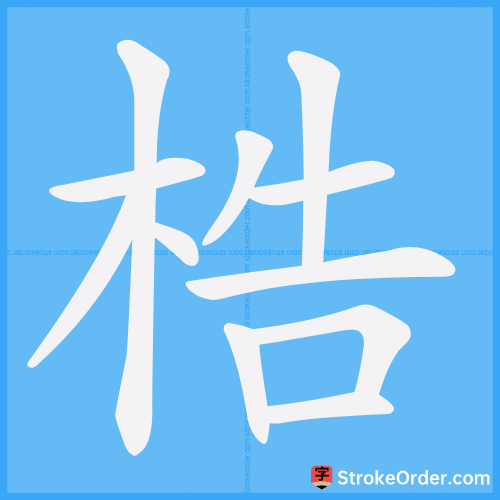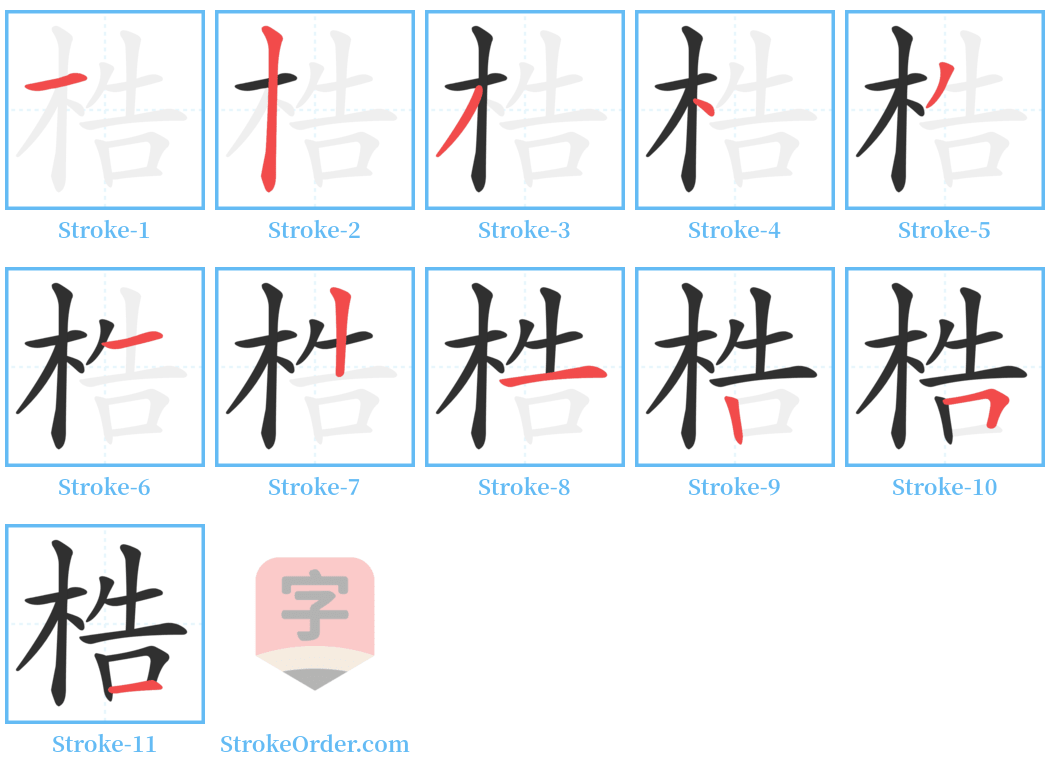梏 Stroke Order
Animated Stroke Order of 梏

Stroke Order Diagrams for 梏

Step-by-Step Handwriting Guide for 梏

Learn to Write Chinese Characters with Video Tutorials
Watch the video of writing the Chinese character "梏", learn the correct stroke order (笔顺) of the character "梏", and master the standard way of writing the character "梏".
Free Printable Handwriting Practice with Stroke Order: 梏
Printable Writing Practice Worksheet of "梏" in Portrait Orientation (Tian Zi Ge)

Printable Writing Practice Worksheet of "梏" in Landscape Orientation (Tian Zi Ge)

Information of 梏
Pinyin
gù
Radical
木
Strokes
11 strokes
Usage
★★★★
Definition
braces (med.) / fetters / manacles
梏
拼音: [gù]
词性: 名词
1. 古代拘在罪人两手的刑具。
(Ancient instrument used to bind the hands of criminals.)
1. 同本义 ([En.] wooden hand-shackles)
(Same as the original meaning - wooden hand shackles.)
引文:
1. 《说文》:梏,手械也。
(Shuōwén: "Gù" means handcuffs.)
2. 《吕氏春秋·仲春》:命有司省囹圄,去桎梏。
(Lǚshìchūnqiū: "Order the officials to examine the prisons and eliminate shackles and handcuffs.")
3. 在足曰桎,在手曰梏。——《易·蒙》疏
(In feet, it is called zhì, in hands, it is called gù. — Commentary from Yìjīng: Méng.)
4. 《汉书·范滂传》:甫愍然为之改容,乃得并解桎梏。
(Hànshū: "He felt pity and changed his expression, then he was allowed to remove his shackles.")
5. 《周礼·秋官·掌囚》:凡囚者,上罪梏拲(两手关械)而桎,中罪桎梏,下罪梏。
(Zhōulǐ: "For all prisoners, the top crimes receive hand shackles and larger shackles, medium crimes receive larger shackles, and lower crimes receive hand shackles.")
例:
又如: 梏桎 (即桎梏。束缚手足的刑具); 梏掠 (用刑拷问); 梏拲 (古代刑具,也指械系)
(For example: gùzhì (shackles for hands and feet); gùlüè (to torture with interrogation); gùzhuā (an ancient torture instrument, also refers to being tied up).)
2. 为了防牛触人而套在牛角上的横木。字本作告 ([En.] joke)
(A horizontal wood attached to cow's horns to prevent them from harming people. The character was originally written as "告" (gào).)
引文:
1. 《说文》:告,牛触人,角箸横木,所以告人也。
(Shuōwén: "Gào" is used to prevent cows from hurting humans, by using a horizontal wood on their horns for that purpose.)
梏
拼音: [gù]
词性: 动词
1. 戴上手铐。也泛指械系,拘系 ([En.] fetter)
(To be handcuffed. It also generally refers to being restrained or bound.)
引文:
1. 《左传·成公十七年》:执而梏之。
(Zuǒzhuàn: "They held him and handcuffed him.")
2. 清·方苞《狱中杂记》:主梏扑者亦然。
(Qīng: Fāng Bāo, "Notes from Prison": "The one who is subject to punishment is also treated this way.")
2. 监禁 ([En.] imprison)
(To imprison.)
引文:
1. 《山海经》:帝乃梏之疏属之山(疏属:山名)。
(Shānhǎijīng: "The emperor therefore imprisoned him in the mountain of Shūshǔ (name of a mountain).")
3. 约束,束缚 ([En.] tie; bind; restrain)
(To tie, bind, or restrain.)
例:
如: 梏亡 (因受束缚而丧失); 梏拲 (比喻束缚人的事物)
(For example: gùwáng (to lose due to being bound); gùzhuā (metaphorically refers to things that bind people).)
Input Method for 梏
Pinyin
gu4
Wubi
stfk
Cangjie
dhgr
Zhengma
fmj
Four Corner
44961
Unicode
U+688f
Same Pronunciation Characters